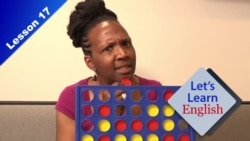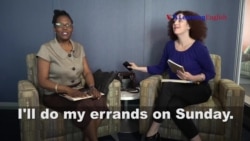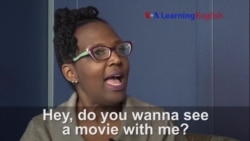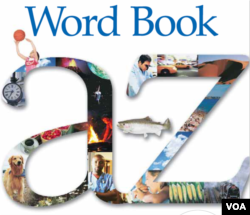Summary (Ringkasan)
Anna tries to plan to see a movie with a friend. But they are both very busy. Will they find a time to get together? What will they do?
Anna merencanakan untuk menonton film dengan temannya. Tapi, mereka berdua sangat sibuk. Apakah mereka akan menemukan waktu untuk bertemu? Apa yang akan mereka lakukan?
Speaking (Berbicara)
English has two ways to show something is happening at a future time. To form the simple future, use will and then the simple form of the verb. You can use will to express a desire to do something. The second form of the simple future is be going to. Use "be + going to" when you already have a plan to do something.
Bahasa Inggris punya dua cara untuk menunjukkan apa yang akan terjadi di masa depan. Untuk membentuk kala masa depan, gunakan will dan bentuk sederhana kata kerjanya. Anda bisa menggunakan will untuk mengekspresikan keinginan untuk melakukan sesuatu. Bentuk kedua simple future adalah be going to. Gunakan "be + going to" kalau Anda sudah punya rencana untuk melakukan sesuatu.
Pronunciation (Pengucapan)
Conversation (Percakapan)
Anna: This city is very interesting, I really like my job, and I have some good friends! Speaking of friends … I see one now! Marsha! Hi!
Writing (Menulis)
What do you like to do with your friends? Is it easy or difficult to find time to be with your friends? Write to us in the Comments section or send us an email. Tell us two or three things you do with friends using words like always, usually and sometimes. You can also download the Activity Sheet and practice writing about your schedule.
Learning Strategy (Strategi Belajar)
Learning Strategies are the thoughts and actions that help make learning easier or more effective.
The learning strategy for this lesson is Evaluate. When we evaluate our own language learning, we think of how well we are learning, remembering and practicing the language.
We evaluate after doing many things. For example, in the video for this lesson, Anna and Marsha talk about jogging. Anna evaluates her plan to jog: "I will try because it is good for you." Then, Marsha evaluates her feelings after jogging. "I always feel great after I jog." You can evaluate any time you stop to think about your learning (that is, monitor, the strategy in Lesson 16). Ask yourself: "Am I listening often to English? Am I practicing English every day? How can I learn more?" Evaluating helps learners to understand what is working well and make new plans for learning well.
How do you evaluate your own learning? Write to us in the Comments section or send us an email. Teachers, see the Lesson Plan for more details on teaching this strategy.
Strategi belajar adalah gagasan dan tindakan yang akan mempermudah pembelajaran dan membuatnya lebih efektif.
Strategi belajar kali ini adalah Evaluate atau mengevaluasi. Ketika kita mengevaluasi pembelajaran bahasa kita, kita berpikir sejauh mana kita belajar, mengingat dan melatih bahasa yang kita pelajari.
Kita melakukan evaluasi setelah melakukan berbagai hal. Contohnya, di video ini, Anna dan Marsha bicara tentang jogging. Anna mengevaluasi rencananya untuk jogging: "I will try because it is good for you." Lalu, Marsha mengevaluasi apa yang ia rasakan setelah jogging. "I always feel great after I jog." Anda bisa melakukan evaluasi kapan saja Anda memikirkan kemajuan pembelajaran Anda (itu adalah, monitor, strategi pada Lesson 16). Tanya dirimu sendiri: "Am I listening often to English? Am I practicing English every day? How can I learn more?" Evaluasi membantu pelajar memahami apa yang berjalan dengan baik dan membuat rencana baru.
Bagaimana Anda mengevaluasi pembelajaran Anda? Tulis di kolom komentar atau email kami. Teachers, see the Lesson Plan for more details on teaching this strategy.
Quiz (Tes)
Test your understanding by taking this listening quiz. Play the video, then choose the best answer.
Tes pemahamanmu dengan mengerjakan tes ini. Mainkan videonya, lalu pilih jawaban yang paling benar.
______________________________________________________________
New Words (Kata-kata Baru)
Note: You can listen to the definitions of these words in the Speaking Practice Video.
______________________________________________________________
Free Materials
Download the VOA Learning English Word Book for a dictionary of the words we use on this website.
Each Let's Learn English lesson has an Activity Sheet for extra practice on your own or in the classroom. In this lesson, you can use it to practice talking about activities and schedules.
Unduh VOA Learning English Word Book sebagai kamus kata-kata yang digunakan di situs ini.
Masing-masing pelajaran dalam Let's Learn English, ada Activity Sheet agar Anda bisa belajar sendiri atau di kelas. Di pelajaran kali ini, Anda bisa menggunakannya untuk berlatih membicarakan tentang aktivitas dan jadwal.
For Teachers
See the Lesson Plan for this lesson for ideas and more teaching resources. Send us an email if you have comments on this course or questions.
Grammar focus: Simple Future tense with will and going to.
Topics: Talking about schedules and leisure time activities
Learning Strategy: Evaluate
Speaking & Pronunciation Focus: Future verb forms; shortened forms of future verbs and invitations.
______________________________________________________________
Now it's your turn. Send us an email or write to us in the Comments section below or on our Facebook page to let us know what you think of this lesson.





















